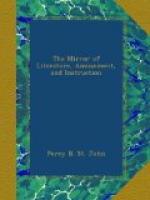and elevation, which,—if it be not considered
as a predisposition to welcome the visitation of those
unearthly substances that are impalpable to our sight
in moments of less hallowed sentiment,—is
indisputably the state of mind in which the imagination
is most readily excited, and the understanding most
favourably inclined to grant a credulous reception
to its visions. The apartment also which was
appropriated to Lord Londonderry, was calculated to
foster such a tone of feeling. From its antique
appointments; from the dark and richly-carved panels
of its wainscot; from its yawning width and height
of chimney—looking like the open entrance
to a tomb, of which the surrounding ornaments appeared
to form the sculptures and the entablature;—from
the portraits of grim men and severe-eyed women, arrayed
in orderly procession along the walls, and scowling
a contemptuous enmity against the degenerate invader
of their gloomy bowers and venerable halls; from the
vast, dusky, ponderous, and complicated draperies
that concealed the windows, and hung with the gloomy
grandeur of funereal trappings about the hearse-like
piece of furniture that was destined for his bed,—Lord
L., on entering his apartment, might be conscious
of some mental depression, and surrounded by such
a world of melancholy images, might, perhaps, feel
himself more than usually inclined to submit to the
influences of superstition. It is not possible
that these sentiments should have been allied to any
feelings of apprehension. Fear is acknowledged
to be a most mighty master over the visions of the
imagination. It can “call spirits from
the vasty deep”—and they do come,
when it does call for them. It trembles at the
anticipation of approaching evil, and then encounters
in every passing shadow the substance of the dream
it trembled at. But such could not have been
the origin of the form which addressed itself to the
view of Lord Londonderry. Fear is a quality that
was never known to mingle in the character of a Stewart.
Lord Londonderry examined his chamber—he
made himself acquainted with the forms and faces of
the ancient possessors of the mansion, who sat up
right in their ebony frames to receive his salutation;
and then, after dismissing his valet, he retired to
bed. His candles had not been long extinguished,
when he perceived a light gleaming on the draperies
of the lofty canopy over his head. Conscious
that there was no fire in the grate—that
the curtains were closed—that the chamber
had been in perfect darkness but a few moments before,
he supposed that some intruder must have accidentally
entered his apartment; and, turning hastily round to
the side from which the light proceeded—saw—to
his infinite astonishment—not the form of
any human visiter—but the figure of a fair
boy, who seemed to be garmented in rays of mild and
tempered glory, which beamed palely from his slender
form, like the faint light of the declining moon, and
rendered the objects which were nearest to him dimly




